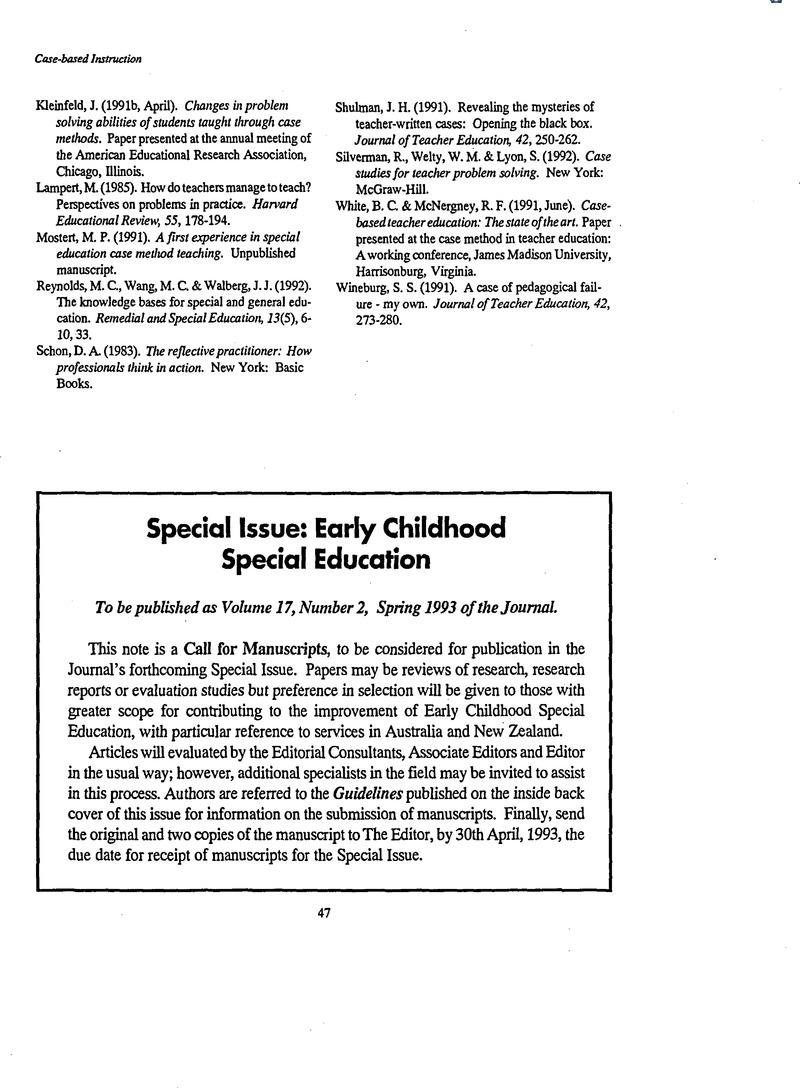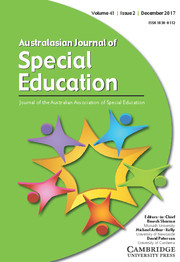No CrossRef data available.
Article contents
Special Issue: Early Childhood Special Education
Published online by Cambridge University Press: 26 February 2016
Abstract
An abstract is not available for this content so a preview has been provided. Please use the Get access link above for information on how to access this content.

- Type
- Notice of Special Issue
- Information
- Copyright
- Copyright © The Australian Association of Special Education 1992
References
Carter, K. (1990). Teachers’ knowledge and learning to teach. In W. R., Houston (Ed.), Handbook of research on teacher education, (pp. 291–319). New York: Macmillan.Google Scholar
Clandinin, D.J. (1985). Personal practical knowledge: A study of teachers’ classroom images. Curriculum Inquiry, 15, 361–385.CrossRefGoogle Scholar
Connelly, R.M. & Clandinin, D.J. (1986). On narrative method, personal philosophy, and narrative unities in the story of teaching. Journal of Research in Science Teaching, 23, 293–310.Google Scholar
Elbaz, F. (1990). Knowledge and discourse: The evolution of research on teacher thinking. In Day, C., Pope, M. & Denicolo, P. (Eds.), Insights into teachers’ thinking and practice, (pp. 15–42.) Bristol, PA: The Falmer Press.Google Scholar
Elbaz, F. (1991). Research on teachers’ knowledge: The evolution of a discourse. Journal of Curriculum Studies, 23, 1–19.CrossRefGoogle Scholar
Gage, N.L. & Needels, M. G. (1989). Process-product research on teaching: A review and criticism. The Elementary School Journal, 89, 253–299.CrossRefGoogle Scholar
Kagan, D.M. & Tippins, D.J. (1991). How teachers’ classroom cases express their pedagogical beliefs. Journal of Teacher Education, 42, 281–291.Google Scholar
James, F.R. (1991). An analysis of case-based instruction in teacher preparation. (Doctoral dissertation, University of Virginia. 1991).Google Scholar
Kauffman, J.M., Mostert, M.P., Nuttycombe, D.G., Trent, S. C. & Hallahan, D.P. (1993a). Instructor’s manual for managing classroom behavior: A reflective case-based approach. Boston: Allyn & Bacon.Google Scholar
Kauffman, J. M., Mostert, M.P., Nuttycombe, D.G., Trent, S.G. & Hallahan, D.P. (1993b). Managing classroom behavior: A reflective case-based approach. Boston: Allyn & Bacon.Google Scholar
Kerr, M.M. & Nelson, C.M. (1989). Strategies for managing behavior problems in the classroom. Columbus: Merrill.Google Scholar
Kleinfeld, J. (1991a, April). Wrestling with the angel: What student teachers ¡earn from writing cases. Paper presented at the annual meeting of the American Educational Research Association, Chicago, Illinois.Google Scholar
Kleinfeld, J. (1991b, April). Changes in problem solving abilities of students taught through case methods. Paper presented at the annual meeting of the American Educational Research Association, Chicago, Illinois.Google Scholar
Lampert, M. (1985). How do teachers manage to teach? Perspectives on problems in practice. Harvard Educational Review, 55, 178–194.CrossRefGoogle Scholar
Mostert, M.P. (1991). A first experience in special education case metliod teaching. Unpublished manuscript.Google Scholar
Reynolds, M. C., Wang, M. C. & Walberg, J.J. (1992). The knowledge bases for special and general education. Remedial and Special Education, 13(5), 6–10, 33.Google Scholar
Schon, D.A. (1983). The reflective practitioner: How professionals think in action. New York: Basic Books.Google Scholar
Shulman, J.H. (1991). Revealing the mysteries of teacher-written cases: Opening the black box. Journal of Teacher Education, 42, 250–262.CrossRefGoogle Scholar
Silverman, R., Welty, W.M. & Lyon, S. (1992). Case studies for teacher problem solving. New York: McGraw-Hill.Google Scholar
White, B. C. & McNergney, R.F. (1991, June). Case-based teacher education: The state of the art. Paper presented at the case method in teacher education: A working conference, James Madison University, Harrisonburg, Virginia.Google Scholar
Wineburg, S.S. (1991). A case of pedagogical failure - my own. Journal of Teacher Education, 42, 273–280.Google Scholar


